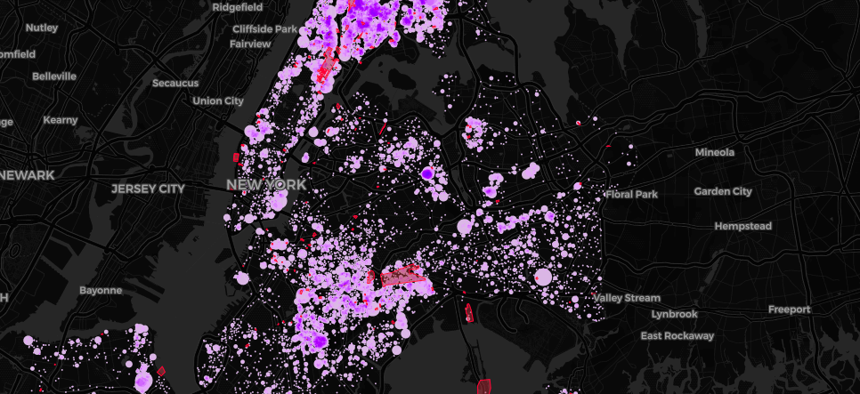A new online tool maps NYC evictions

A new online tool shows where evictions went down in New York City last year. The Right to Counsel NYC Coalition
The Children’s Village has something to say about how the New York City Administration for Children’s Services handles background checks. The New York Post reported on May 6 that the agency “routinely hands over neglected and abused kids to foster parents without proof that background checks or on-site visits were ever done first” based on a new report by city Comptroller Scott Stringer. A total of 89 out of 110 foster homes lacked “critical records” showing they were in compliance with state regulations, according to the report (available here).
Among the agencies named by the Poast was The Children’s Village. The nonprofit provided an exclusive statement to NYN Media following the Post’s report, where Jeremy Kohomban, president of The Children’s Village, pushed back against the report.
“This work is difficult and never perfect but we are extremely proud of our foster families and the increased number of kin who are stepping up to keep children safe and within family,” Kohomban said in the statement. “We will always do all we can to ensure safety. In this case, we believe that ACS is correct in their assessment that there are significant inaccuracies in this report. Regardless, ACS goes beyond the legal requirements in its oversight of foster homes – and we are already doing everything this report recommends."
Two out-of-state nonprofits are getting new contracts from the Administration for Children’s Services. The Connecticut-based American School for the Deaf and the Pennsylvania-based Woods Services will provide extraordinary needs foster care services on behalf of the agency, per respective $1.51 million and $5.97 million contract renewals.
A new online tool shows maps evictions in New York City last year. There were a total of 18,007 residential evictions in 2018, with some occurring in neighborhoods that have experienced rezonings in recent years, according to the Right to Counsel NYC Coalition. See the map here.
“Despite the sheer enormity of this number, our society tends to individualize responsibility, blaming tenants for falling behind on rent or for being exceptionally ‘bad tenants’ who don’t fit into the system,” reads a description of the map. “Yet, when you witness the scale of the eviction crisis in NYC, you know something is up. This is not an individual problem, but the very way the housing system is set up to work.”
The Rockefeller Institute of Government has identified the 500 places most at risk of being undercounted in the upcoming census. Community-based organizations have been making a big push for funding for outreach on the census, which will determine congressional representation and federal funding for a multitude of programming. The new tools are the At-Risk Community Index, which identifies the 500 communities at risk of being undercounted, as well as the 2010 Census Response Rates in New York State. A press release states that the latter tool “compares response rates to key categories such as internet access, percent foreign born, race, and poverty by all 62 counties and more than 4,900 census tracts across the state.”
The Center on New York City Affairs is hosting a discussion on “salary parity” tomorrow. Specifically, experts on early childhood education will discuss how to close the salary differences between early childhood educators who work for the city Department of Education and those at community-based organizations that contract with the city.
The event will take place from 9 a.m. to 11 a.m. at Theresa Lang Student Center, 55 West 13th Street in Manhattan. Speakers include: Andrea Anthony, executive director at Day Care Council of New York; Michelle Paige, associate executive director of early childhood programs at University Settlement; Louisa Chafee, senior vice-president of external relations and public policy at UJA-Federation of New York; and Rosemarie Sinclair, first vice president at the Council of School Supervisors and Administrators. RSVP here.
Advocates want $70 million in the New York City budget for bridge programs. Elected officials, including City Council members Carlina Rivera, Ritchie Torres, Antonio Reynoso, and Mark Treyger, joined dozens of activists at City Hall on Monday to call on Mayor Bill de Blasio to support the proposed funding for the upcoming fiscal year.
De Blasio said in 2014 that he would support $60 million in city investments by 2020 in the programs, which help low-skill and low-education people find entry-level work and training. The mayor has yet to provide the full funding and advocates now say the need has grown by $10 million in recent years – and the City Council agrees – hence the $70 million figure.
“Given the city’s magnetic appeal, New York City has never struggled to attract some of the best talent in the world,” said Joey Ortiz, executive director of the NYC Employment and Training Coalition, in a press release. "As the economy continues to thrive, investments into bridge programs open the doors that often shut out marginalized New Yorkers, by providing them the necessary educational on-ramps to access careers in competitive companies and industries that call New York home.
NEXT STORY: Going gonzo on school security
